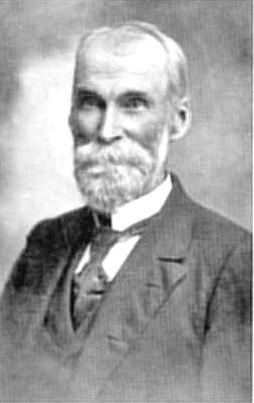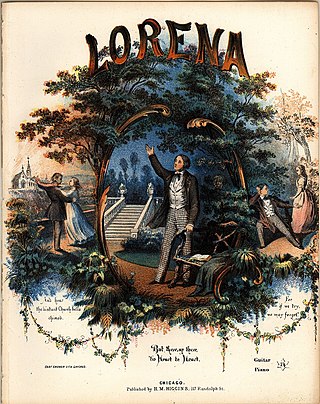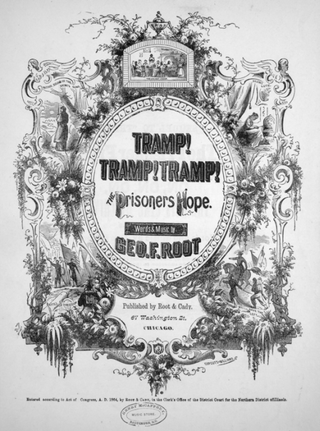
"Yankee Doodle" is a traditional song and nursery rhyme, the early versions of which predate the Seven Years' War and American Revolutionary War. It is often sung patriotically in the United States today. It is the state anthem of Connecticut. Its Roud Folk Song Index number is 4501.

"John Brown's Body" is a United States marching song about the abolitionist John Brown. The song was popular in the Union during the American Civil War. The song arose out of the folk hymn tradition of the American camp meeting movement of the late 18th and early 19th century. According to an 1889 account, the original John Brown lyrics were a collective effort by a group of Union soldiers who were referring both to the famous John Brown and also, humorously, to a Sergeant John Brown of their own battalion. Various other authors have published additional verses or claimed credit for originating the John Brown lyrics and tune.

The "Battle Cry of Freedom", also known as "Rally 'Round the Flag", is a song written in 1862 by American composer George Frederick Root (1820–1895) during the American Civil War. A patriotic song advocating the causes of Unionism and abolitionism, it became so popular that composer H. L. Schreiner and lyricist W. H. Barnes adapted it for the Confederacy.

Walter Kittredge, was a famous American minstrel and songwriter. Over his career he wrote over 500 songs, many of them dealing with themes of abolitionism and the American Civil War, the most famous of which was Tenting on the Old Camp Ground.

James Lord Pierpont was an American songwriter, arranger, organist, Confederate States soldier, and composer. Pierpont wrote and composed "Jingle Bells" in 1857, originally titled "The One Horse Open Sleigh".

"Annie Lisle" is an 1857 ballad by Boston, Massachusetts songwriter H. S. Thompson, first published by Moulton & Clark of Newburyport, Massachusetts, and later by Oliver Ditson & Co. It is about the death of a young maiden, by what some have speculated to be tuberculosis. However, the lyric does not explicitly mention tuberculosis, or "consumption" as it was called then. The song might have slipped into obscurity had the tune not been adopted by countless colleges, universities, and high schools worldwide as their respective alma mater songs.
"Sussex by the Sea" is a song written in 1907 by William Ward-Higgs, often considered to be the unofficial county anthem of Sussex. It became well known throughout Sussex and is regularly sung at celebrations throughout the county. It can be heard during many sporting events in the county, during the Sussex bonfire celebrations and it is played by marching bands and Morris dancers across Sussex. It is the adopted song of Brighton & Hove Albion Football Club, Sussex Division Royal Naval Reserve, Sussex Association of Naval Officers and Sussex County Cricket Club.

"Just before the Battle, Mother" was a popular song during the American Civil War, particularly among troops in the Union Army. It was written and published by Chicago-based George F. Root. It was also a popular song with adherents of the Primrose League in England, and was a central part of Victoria Day celebrations in Canada during the late 19th and early-to-mid 20th centuries.

"Old Black Joe" is a parlor song by Stephen Foster (1826–1864). It was published by Firth, Pond & Co. of New York in 1860. Ken Emerson, author of the book Doo-Dah! (1998), indicates that Foster's fictional Joe was inspired by a servant in the home of Foster's father-in-law, Dr. McDowell of Pittsburgh. The song is not written in dialect.

"Lorena" is an American antebellum song with Ohio origins. The lyrics were written in 1856 by Rev. Henry D. L. Webster, after a broken engagement. He wrote a long poem about his fiancée Ella Blocksom, but changed her name at first to "Bertha" and later to "Lorena", perhaps an adaptation of "Lenore" from Edgar Allan Poe's poem "The Raven." Henry Webster's friend Joseph Philbrick Webster wrote the music, and the song was first published in Chicago in 1857. It became a favorite of soldiers of both sides during the American Civil War. Members of the Western Writers of America chose it as one of the Top 100 Western songs of all time.

"Hard Tack, Come Again No More" is an American Civil War-era parody of the song "Hard Times, Come Again No More." First called "Hard Crackers, Come Again No More!", it is a sarcastic complaint about the quality of some of the provisions provided by military contractors, specifically hardtack. The authors of the many verses of the parody are unknown, although the first version is often attributed to Josiah Fowler of the First Iowa Infantry dating to just after the Battle of Boonville, June 1861.

"Hail to Pitt" is the most traditional fight song of the University of Pittsburgh, which is commonly referred to as Pitt. The saying "Hail to Pitt!" is also the most traditional and commonly used slogan of the University of Pittsburgh and its athletics teams. The slogan is frequently used in promotional material, printed on merchandise and souvenirs. It was also the title of a 1982 history of Pitt athletics by author Jim O'Brien. The slogan is often used among alumni as a statement of affiliation, including as a closing signature in conversation or correspondence between alumni, and is sometime abbreviated as "HTP" or "H2P", the latter of which is a registered trademark of the university and is frequently used on official university signage and merchandise.

"Red Wing" is a popular song written in 1907 with music by F.A Mills and lyrics by Thurland Chattaway. Mills adapted the music of the verse from Robert Schumann's piano composition "The Happy Farmer, Returning From Work" from his 1848 Album for the Young, Opus 68. The song tells of a young Indian girl's loss of her sweetheart who has died in battle.

Oliver Ditson was an American businessman and founder of Oliver Ditson and Company, one of the major music publishing houses of the late 19th century.

"Tramp! Tramp! Tramp! " was one of the most popular songs of the American Civil War. George F. Root wrote both the words and music and published it in 1864 to give hope to the Union prisoners of war. The song is written from the prisoner's point of view. The chorus tells his fellow prisoners that hope is coming. A Confederate version and various other versions have been made.
"Down in the Valley", also known as "Birmingham Jail", is a traditional American folk song. It has been recorded by many artists and is included in the Songs of Expanding America recordings in Burl Ives' six-album set Historical America in Song.

During the American Civil War, music played a prominent role on each side of the conflict, Union and Confederate. On the battlefield, different instruments including bugles, drums, and fifes were played to issue marching orders or sometimes simply to boost the morale of one's fellow soldiers. Singing was also employed not only as a recreational activity but as a release from the inevitable tensions that come with fighting in a war. In camp, music was a diversion away from the bloodshed, helping the soldiers deal with homesickness and boredom. Soldiers of both sides often engaged in recreation with musical instruments, and when the opposing armies were near each other, sometimes the bands from both sides of the conflict played against each other on the night before a battle.

Samuel N. Mitchell (1846–1905) was an American song lyricist and newspaperman who wrote lyrics for a number of popular songs in the 1870s.
Caroline Dana Howe was an American writer of prose, poetry, and hymns. Her celebrated song, "Leaf by Leaf the Roses Fall", was claimed and used by several different authors, until her authorship was reasserted, the publishers appending her name to all later editions. A large number of Howe's songs were set to music for which they were easily adapted, and were found in sheet music and in church collections. The songs were gathered into at least 26 collections, and it was said that no living writer in Maine was more favorably known in that day as a writer of songs than Howe. She was also well known as a writer of short serial stories, juvenile sketches, and essays. The Massachusetts Sunday School Society published a book of about 200 pages of hers, carried successfully through several editions. Howe died in 1907.




















